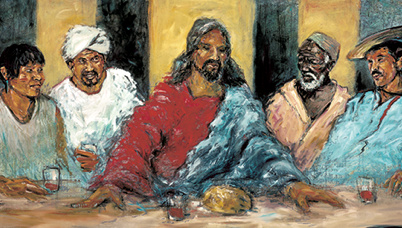Why metaphor matters in any church first struck me when the vicar of the church in Southall where I was working shared a contentious cross-cultural issue they were facing. One cultural group held that children during services should be ‘free to be free’ while another held that they should be ‘seen but not heard’. Dialogue made it clear that essentially both groups were using two very different metaphors for church. One held that Church is “family”, and so, children should be let behave as at home, whereas the other held that Church is “temple”, and that they should behave as if meeting the King! Yet both groups were each being totally biblical. In their earth-shattering book “Metaphors We Live By”, Lakoff & Johnson propose that our implicit use of metaphors like these shape not just how we consider such issues but also how we behave towards them, and can even limit our thinking about them, as with here.
John Root proposes two further metaphors for church to help understand differing attitudes to timekeeping, a common cross-cultural bane. He suggests that punctual groups can hold a Church as “theatre” metaphor, and so, need to absorb events undisturbed, whereas others hold a Church as “rock concert” metaphor, which lets folks come and go as they wish. Both occur today influencing forms of church but Biblical bases for these are trickier: some worship descriptions in the Psalms feel akin to rock concerts of their day, and there are two surprising lost-in-translation references to Church as “theatre” in Scripture, which is odd given its prominence in Greek society then to promote new-fangled ideas like democracy. Why not then also Christianity? However, not appearing directly in Scripture does not make something automatically right or wrong – dedicated Christian church buildings aren’t mentioned either! So, we cannot judge.
Evidence of prevailing metaphors in any church are often quickly observed. In Southall, Church as “family” was seen in calling respected seniors “Uncle” and “Auntie”, celebrating birthdays and having low production values and timekeeping priorities. Church as “temple” was seen in how people dress, calling the venue a ‘Sanctuary’ and highlighting its distinct holiness compared to life outside. Church as “theatre” will have an auditorium, stage and worship band, and will have high production values, as will Church as “rock concert”. Like actual theatres, for Church as “theatre”, attendees may well review and score content, and get disgruntled over music, seating and undesirable behaviours like lateness. Everyone also ultimately has consumer choice though to try other ‘theatres’ if things stay irritating. By contrast, people leaving churches where Church is “family” often speak of their pain in doing so.
One recurring theme for people of new cultures coming into an established church is that they come with a different metaphor than the one already there. Often, they use Church is “family”, and its absence there will deeply disappoint them. Some may choose to assimilate or switch their behaviour when at home or at church. Others stay in their own social groups, as seen most often at fellowship/coffee times. These are known as multicultural churches, where different cultural groups mainly keep to themselves. Many leave such churches and form their own, which will experience exactly the same issues over time. By contrast, intercultural church will see such groups not just present and mixing, but eventually being included and belonging.
Few church leaders sit down to decide which metaphor their church will use. My church in England is one exception. The functioning metaphor a church uses is typically inherited historically or from surrounding majority culture. Attendees using it are mostly as unaware of it as a fish is unaware of the water in which it swims. It is hard to change a church’s predominant metaphor but multicultural church can facilitate this, provided it knows how alternative metaphors work. It will be bumpy. Childcare issues come in intercultural churches but not in multicultural churches, where one prevailing culture dominates. Root puts forward that if someone finds a service wholly satisfying then something is wrong. Each of us should look not just to our own interests. Intercultural church gives opportunity to learn from each other and to grow in grace. Cultural awareness and insights can help a church work through contentious issues.
Scripture can encourage though. The Ephesian church had two very distinctive cultures: Jewish background believers who had imbibed Scripture in their mothers’ milk, and other non-Jewish believers, who had instead come from a very different culture of magic and fertility god worship. There were surely clashes but Paul lays down a marker with which they can measure their maturity. It is not Biblical knowledge; it is not a ‘right’ or ‘wrong’ way of doing Church; it is not even evangelism or social action. It is unity. It can be done.

The Last Supper with Twelve Tribes, Hyatt Moore (cropped with permission of artist)
Peter Tate first served cross-culturally with Wycliffe Bible Translators, and then while working in a church in multi-faith Southall, London. He has helped a variety of secular and Christian organisations to build confidence and skills to help people work with different faiths and cultures. He now lives in England but often travels home to Belfast.
Please note that the statements and views expressed in this article of those of the author and do not necessarily represent those of Contemporary Christianity.


Recent Comments